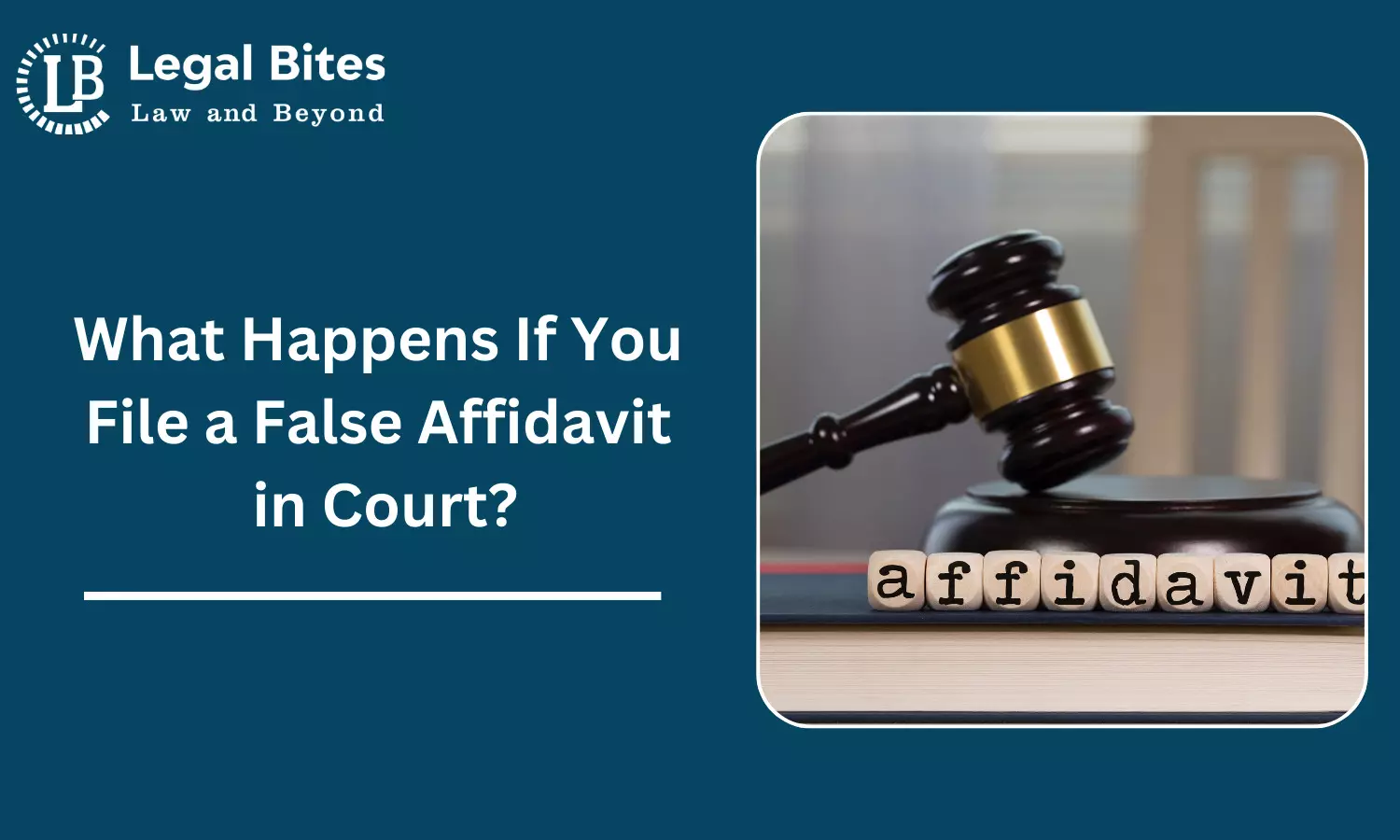What Happens If You File a False Affidavit in Court?
The article explores the ramifications of filing a false Affidavit in Court, examining the legal penalties, and potential charges of perjury.

The article 'What Happens If You File a False Affidavit in Court?' explores the ramifications of filing a false Affidavit in Court, examining the legal penalties, potential charges of perjury or contempt of court, and highlighting the importance of truthfulness and honesty in legal proceedings.
Introduction
If a fake affidavit is filed and key facts are concealed, it is considered wrong and unethical. The fairness and usefulness of legal proceedings are dependent on an awareness of the legal implications. An affidavit is a voluntary written declaration prepared under oath by an individual (the deponent) who performs, swears, verifies, and affirms. This individual also confirms that the information in the preceding statement is correct and complete and that nothing has been hidden or misrepresented. He also attests to the accuracy of the same. The deponent may opt to sign the affidavit in front of witnesses.
What is a False Affidavit?
A sworn statement of facts made by someone aware that certain facts and circumstances have occurred is called an affidavit. A deponent is the one who signs and makes such a declaration. A written declaration attesting to the fact that the deponent has not withheld any material information and that the contents are truthful and correct to the best of his knowledge is known as an affidavit. It has been properly certified or attested by an oath commissioner or notary. These notaries public and oath commissioners are chosen by the legal system. Making sure the deponent's signature is authentic is the responsibility of the notary and oath commissioners. As a result, the deponent must personally appear before the notary or oath commissioner for the affidavit to be attested.
The affidavit needs to be numbered and paragraphed. The affidavit cannot state the deponent's views and ideas; instead, it must include facts and situations that are known to a person. Furthermore, it is not appropriate to cite facts that are hearsay evidence, that is, facts based on information obtained from other people.
A wrong affirmation is one in which the signatory certifies beneath punishment of law that the statements attested to within the archive are veritable, total, and precise, indeed even though the explanations are untrue or deceiving. In most wards, submitting a wrong testimony is considered a criminal act and is proportionate to prevarication. Composing a false explanation can result in punishments such as fines, imprisonment, or both. A respondent may state as a legitimate defence that the sworn statement was pulled back sometime recently the offended party had a sensible chance to depend on it and sometime recently the wrong sworn statement was found.
To ascertain whether wrongdoing was committed and the correct discipline, the court regularly gathers a hearing on charges that an untrue affirmation was given to the court or amid an out-of-court exchange. Affidavits are needed for some court files, such as when a deposition examination is requested.
In a case involving a fraudulent affidavit, the plaintiff frequently needs to establish six components. The offended party must, to begin with, illustrate that she took a pledge before a court officer or other specialist figure, which the affiant marked the record with the purpose that it would be respected as honest. Another, the offended party must illustrate that, despite the affiant's intention for it to be untrue, the offended party intentionally pronounced all of the statements made within the sworn statement to be genuine. It is frequently necessary to illustrate that the data within the untrue explanation is noteworthy enough to cause the plaintiff to endure harm in case he depends on the affirmation, which the offended party knew he was beneath the pledge when he marked the document.
In case a litigant considers the articulations sworn to within the affidavit to be precise, he is habitually found not blameworthy of wrongdoing. In common, affirmations say that the data is genuine to the finest of the affiant's information; by the by, in certain circumstances, the defendant's suppositions may struggle with the proof. A retraction of the affidavit is another common legal defence that the defendant has. If the plaintiff did not significantly rely on the affidavit and the false affidavit is withdrawn before it is discovered, the defendant is frequently found not guilty of perjury.
Consequences
When someone intentionally swears false and frivolous statements in an affidavit to be true, correct, and accurate and signs it, they are committing a false affidavit and misleading the court. This is blatantly abusive to the legal system and causes excessive delays in the procedures. Filing a false affidavit is considered an offence under Section 193 of the Indian Penal Code, along with perjury. In addition, filing a fake affidavit could result in criminal contempt of court charges. A criminal process against the guilty may be initiated by applying false testimony under Sections 340 and 195 of the Code of Criminal Procedure before a criminal or civil court.
You may moreover be subject to respectful claims looking for remuneration for any harm you endured. You may confront legitimate sanctions like fines, imprisonment time, terrible court choices, and more. Your validity will be harmed, and you'll lose the belief of your colleagues, clients, and community. A false affidavit can also damage the reputation of your legal system and reduce public trust in the justice system. In summary, a false affidavit can lead to:
- Criminal Charges
- Legal Penalties
- Damage To Reputation
- Refusal Of Evidence
- Adverse Court Decisions
Punishment
If a false affidavit were filed in a case that was pending before the Civil Court, it would be a breach of Section 193 of IPC, and that court's written complaint would be the basis for taking legal action. A private complaint alleging a violation of Section 193 IPC lodged by the opposing party is not admissible due to obligatory provisions under Section 195(1) (b) (i) Cr.P.C.
The Indian Penal Code's Section 193 addresses the penalty for providing false testimony. There is a maximum term of seven years in jail of any sort, together with a fine, for anyone who intentionally gives false testimony during any stage of the legal process or fabricates evidence to use at any point during a legal procedure.
Conclusion
Recording untrue sworn statements in court can have genuine legitimate results, extending from criminal charges to legitimate punishments and harm to an individual's notoriety. Typically, due to the truth affirmations are sworn explanations or affirmations that are utilized as verification in court procedures. The punishments related to recording a wrong sworn statement are particular to the locale and the person's circumstances, but can for the most part be anticipated to be severe.
Furthermore, an untrue affirmation can result in the dissent of proof, hence debilitating an individual's case and possibly driving to a negative result in court. In expansion, on the off chance that the wrong affirmation is found to have been made with bad eagerness or as a portion of a greater trick, you'll too be charged with prevarication, hindering justice, or extortion. You may end up in jail, face fines, lose your proficient permit, and have a difficult time getting a job or getting legitimate representation.
References
[1] Tendering of False Affidavit/Undertakings can amount to Contempt of Court: Supreme Court, Available Here
[2] Law on Filing False Affidavit: Can Defaulter Get Benefit of Equity?, Available Here
[3] The Indian Penal Code, 1860
[4] The Code of Criminal Procedure, 1973
[5] Code of Civil Procedure, 1908

